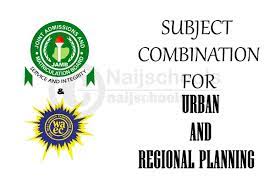In this post, I, (ngschoolboard) am going to explain in detail the Subject Combination for Urban and regional planning for JAMB, WEAC, 0’LEVEL, NCE, and DIRECT ENTRY.
The subject combination is one of the most important things to research while seeking admission into any university in Nigeria.
To avoid gaining provisional admission into the university and at the point of clearance, you will be told that your results are not complete.
This post Subject Combination for Urban and regional planning will answer the following questions:
- JAMB UTME subject combination for urban and regional planning
- WEAC subject combination for urban and regional planning
- DIRECT ENTRY subject combination for urban and regional planning
- 0’LEVEL subject combination for urban and regional planning
Before we proceed with answering these questions let’s take a look at what Urban and regional planning is.

What is Urban and regional planning?
Urban and regional planning is a department that deals with the planning, development, and management of cities, municipalities, and regions.
It involves using various tools and techniques to create vibrant, sustainable, and functional communities that meet the needs of residents.
City and regional planners work with governments, businesses, and communities to design and implement policies, programs, and projects that promote economic growth, environmental sustainability, and social equity.
This sector covers several topics such as transport, housing, cultivation, environmental protection, and social services.
In Nigeria, there two major ways by which you can gain admission into any university, these are through UTME and Direct entry.
In the next subheading, I will be sharing the subject combination for urban and regional planning in various modes of admission.
Admission Requirements for Urban and regional planning
UTME Admission
Admission into the department is mainly through the UTME. UTME sets the required credits to pass that a prospective student must attain before he/she must be given admission to the university to study Urban and regional planning.
JAMB subject combination for urban and regional planning
- English Language,
- Mathematics
- Geography
- and any two from Physics, Chemistry, Economics
SSCE Subject Combination for Urban and regional planning
Students must meet the entry requirement of 5 credits at not more than two sittings in SSCE. The subjects are:
- English Language,
- Mathematics,
- Geography,
- and any two subjects from Chemistry, Biology/Agric. Science, Economics, and Technical Drawing.
WASSCE/WAEC Subject Combination for Urban and regional planning
Students must meet the entry requirement of 5 credits at not more than two sittings in WASSCE. The subjects are:
- English Language,
- Mathematics,
- Geography,
- and any two subjects from Chemistry, Biology/Agric. Science, Economics, and Technical Drawing.
NECO Subject Combination for Urban and regional planning
Students must meet the entry requirement of 5 credits at not more than two sittings in NECO. The subjects are:
- English Language,
- Mathematics,
- Geography,
- and any two subjects from Chemistry, Biology/Agric. Science, Economics, and Technical Drawing.
Direct Entry Admission
Direct-entry students are those who must have obtained an A’level or OND certificate and are looking to further their education in the university.
A’Level Admission requirements
An advanced level passes in at least two of the following:
- Mathematics,
- Geography,
- Economics,
- Physics
- and Chemistry
OND Admission requirement
National Diploma (ND) at Upper Credit in Town and Regional Planning.
NOTE: It is also recommended to have a good foundation in related subjects such as architecture, civil engineering, and sociology, as urban and regional planning involves understanding the interactions between urban spaces, social structures, and built environments.
Overall, a strong background in mathematics, geography, economics, and related fields is essential for studying Urban and Regional Planning at Any university of your choice in Nigeria.
Why is English Compulsory?
This subject is required as it helps to develop strong communication skills, which are essential for effective communication in the field of urban and regional planning.
Why is Mathematics compulsory?
Mathematics is an essential subject for studying Urban and Regional Planning. You will need to have a strong foundation in mathematics, including topics like calculus, geometry, and statistics, as these are essential for understanding the quantitative principles that underpin many aspects of urban and regional planning.
Why is Geography Required
Geography provides a strong foundation in principles of physical and human geography, including environmental studies, land use planning, and regional development, which are relevant to the study of urban and regional planning.
Why is Economics required?
Economics provides a strong foundation in principles of economic theory, including cost-benefit analysis, financial management, and public finance, which are relevant to the study of urban and regional planning.
List of Universities Offering Urban And Regional Planning
- Abia State University, Uturu (ABSU)
- Abubakar Tafawa Balewa University, Bauchi (ATBU)
- Ahmadu Bello University, Zaria (ABU)
- Anambra State University, Uli (COOU)
- Bayero University, Kano (BUK)
- Bells University Of Technology, Ota (BELUNI)
- Benue State University, Makurdi (BSUM)
- Caritas University, Amorji-Nike, Enugu (CARITASUNI)
- Crawford University, Faith City (CRAWFORDUNI)
- Crescent University, Abeokuta (CRECENTUNI)
- Cross Rivers University Of Technology, Calabar (UNICROSS)
- Enugu State University Of Science And Technology, Enugu (ESUT)
- Federal University Of Technology Minna (FUTMINNA)
- Federal University Of Technology, Akure (FUTA)
- Federal University Of Technology, Owerri
- Imo State University, Owerri (IMSU)
- Joseph Ayo Babalola University, Ikeji-Arakeji (JABU)
- Kano University Of Science And Technology, Wudil (KUST)
- Modibo Adama University Of Technology, Yola (MAUTECH)
- Obafemi Awolowo University, Ile-Ife (OAUIFE)
- Olabisi Onabanjo University, Ago-Iwoye (OOU)
- Osun State University, Osogbo (UNIOSUN)
- University Of Ilorin, Ilorin (UILU)
- University Of Jos, Jos (UNIJOS)
- University Of Lagos (UNILAG)
- University Of Nigeria Nsukka (UNN)
- University Of Uyo (UNIUYO)
- Wesley University Of Science And Technology. Ondo (WESLEYUNI)
What can you do with Urban and regional planning Certificate
Urban planning graduates play a key role in managing and developing residential areas to make them safer, more sustainable, and healthier.
If you have a degree in Urban and regional planning, below are a few places where your certificate can get a job ASAP.
Historic buildings inspector/conservation officer: The inspector of historic buildings is a person who checks and controls the condition of historic buildings.
They may also be responsible for observing building regulations and other regulations related to the preservation of historic buildings.
A conservation officer is a person who works to protect and preserve natural resources, including historic buildings and monuments.
Housing manager/officer: Housing managers are responsible for everything from providing residents with a safe place to live to budget management and repairs.
In order to do their job well, housing managers must be familiar with various laws and regulations related to housing.
Local government officer: A local government official is an official who works at one of the three levels of local government.
Local authorities are responsible for the delivery of a range of local services, including planning, housing, environmental health, transport, leisure, culture, and social services.
Town planner: Town planners are professionals who help towns, cities, and counties plan and manage their growth.
They work with planners from other government agencies and organizations to create comprehensive plans that guide the future growth and development of their towns or cities.
Transport planner: Transport planners help you figure out how to get from your starting point to your destination most efficiently.
Urban designer: Urban designers are responsible for creating a vibrant, functional, and aesthetically pleasing urban environment.
They work with urban planners and architects to develop plans for new and existing cities and often engage with the public to get feedback on their plans.
Urban planners often have degrees in architecture or engineering and may have experience in urban planning or landscape design.
Other places where you can fit include:
Civil Service administrator: The Civil Service Administrator is responsible for ensuring that the Civil Service system is administered in a fair and impartial manner. The Civil Service Administrator also oversees the administration of the Federal Employee Retirement System (FERS) and the Federal Employees Health Benefits Program (FEHBP).
Community development worker: A community development worker is a term used to describe someone who helps improve the quality of life of people in their community.
A community development worker can work in a variety of settings, including government agencies, non-profit organizations, and private organizations.
Environmental manager: Environmental management is the practice of protecting natural resources and ecosystems, and ensuring that the human environment is sustainable.
Estates manager: The Estates manager is responsible for all matters related to property management. This includes the collection, maintenance, and resolution of legal disputes arising from real estate.
They must have a thorough knowledge of the law and be able to liaise with lawyers and other professionals to ensure that the estate is handled as efficiently as possible.
Fire risk assessor: A fire risk assessor is an individual who is responsible for the assessment of fire risks in an organization and making recommendations on how to reduce or eliminate the risks.
Landscape architect: Landscape architects are a special breed of architects who design landscapes. Landscapes can be any type of environment, including urban, rural, or natural areas.
Landscape architects often work with other architects and engineers to create unique and beautiful landscapes.
Planning and development surveyor: Planning and development surveyor is an occupation that helps identify and assess the needs of people and businesses in an area, often working with other professionals such as architects and engineers.
Sustainability consultant: A sustainability consultant is a professional who helps organizations become more sustainable.
They can help clients develop and implement sustainability plans, identify and reduce environmental impacts, and create a sustainable business culture.
If you are interested in becoming a sustainability consultant, there are a few things you should know.
Conclusion
In conclusion, the subject combination for urban and regional planning should include geography, mathematics, economics, environmental science, political science, and architecture.
This combination provides students with a well-rounded education that covers the essential topics needed for a successful career in this field.
Choosing the right subject combination for urban and regional planning is an important step toward a successful career in this field.
NGschoolBoard is not just a blog, but a project designed to make students’ research easy and faster. We have a dedicated team of staff working tirelessly to make sure you get quality information from our blog and all other features we will be rolling out soon. do well to subscribe to an email subscription so that you don’t miss out on our latest updates. Shalom!!!






List Of STEM Courses In USA - NGschoolBoard
[…] See Subject Combination for Urban and Regional Planning […]